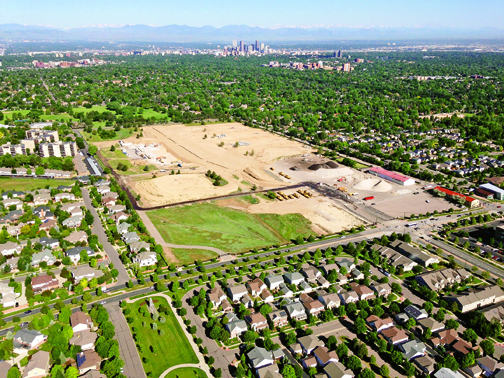Residents Vow To Keep Up The Fight Against Denver’s Reputed Corrupt Planning Process
by Glen Richardson
Citizens fighting what many consider a corrupt and crooked zoning and development system in the City and County of Denver suffered another setback at the hands of the Denver District Court in this case by Judge Kandace Gerdes. The Court dismissed, on procedural grounds, a lawsuit brought on behalf of citizens questioning the legality of what the complaint called a “corrupt consultant-dominated unlawful process.”
High Density Forced On
Quiet Neighborhoods
Buckley Annex is the last remaining undeveloped portion of the former Lowry Air Force Base comprised of approximately 76 acres located at Quebec Street and 1st Avenue. The City’s attempt to bring in extremely high density in an otherwise low density residential neighborhood broug ht stiff citizen resistance as it has across the Denver metro area.
ht stiff citizen resistance as it has across the Denver metro area.
The citizens brought suit against the Denver Planning Board, its executive director Brad Buchanan, individual members of the Planning Board and the City itself asserting that the high density zoning changes violated the Denver Zoning Code and City plans. But Gerdes ruled that since notice under the Denver Zoning Code requires notice of Planning Board Public Hearings to City Council members and registered neighborhood organizations within 200 feet of the application area citizens have no right to protest the actions of the Planning Board unless they are directly adjacent to the application area. Moreover Gerdes ruled that citizens could not challenge Planning Board decisions but must wait until the City Council has adopted a decision by the Planning Board.
In a press release the plaintiffs noted: “The Court’s decision highlights the fact that Denver residents currently have no ability to effectively challenge the land use and the development process in Denver. The playing field is tilted in favor of developers throughout the planning and entitlement process, despite the illusion of ‘outreach’ to the residents and Registered Neighborhood Organizations. As anyone with experience trying to shape their neighborhood knows, the land use process is primarily a collaboration between planning staff and consultants for the developers, who cherry-pick language from Denver’s Plans and the Code to achieve their goals.”
The plaintiffs go on to note that “until Denver has city leadership willing to stop the charade that currently passes for ‘land use planning, Denver’s neighbors and neighborhoods will continue to be the losers.”
Are Denver’s Courts
Actually Independent?
The Buckley Annex case is the third separate litigation Denver residents have lost in their fight against real estate developers and what many believe is a dishonest and corrupt land planning process. Denver District Court Judge Robert McGahey Jr. ruled against citizen plaintiffs, some of whom belonged to a neighborhood group titled “No High rises in West Highlands,” ruling the City’s Comprehensive Plan and Blueprint Denver are merely advisory in nature and could be violated at will by the Denver City Council.
Denver District Judge Herbert L. Stern III dismissed, on the eve of trial, a lawsuit brought by Friends of Denver Parks in the Hentzell Park neighborhood whereby a portion of the park was traded away for a downtown office building after the natural area was declared purportedly “blighted” by Mayor Michael Hancock. Stern denied the ability of the citizens to prove to a jury that the land in question was dedicated or common law park by issuing a summary judgment in favor of the City. He also refused to let the plaintiffs bring the matter to the voters as part of a referendum saying it was an administrative matter and not a legislative one.
Resident Richard Witholder noted, “Citizens are being repeatedly thwarted from bringing any matter to a jury or to the voters of Denver by Denver District Court judges. The old saying ‘You Can’t Fight City Hall’ comes from the fact that judges in places like Denver are not really independent but instead part of the political class that rules the city. They are appointed because they are politically connected and are never replaced no matter how biased they are in favor of the powers that be. The whole system has a stench to it whereby everyday citizens can never win no matter how valid their claims are.”
Another resident Trish Abbott noted, “Denver District court judges never did anything to interrupt the incredibly corrupt Denver Jail shenanigans. Only by going to the federal court system was the corruption and brutality exposed. The question becomes are Denver citizens forever locked into Denver courts where they have little or no chance of ever prevailing or even getting to a jury when fighting directly or indirectly the real estate developers who control the city government.”
Not Giving Up
The plaintiffs in the Buckley Annex case are not, however, giving up. “We will be back,” said Christine O’Connor. “This ruling will delay us, but will not divide us. Neighborhoods are going to take back our city from developers and the city officials who have been beholden to them. Denver residents want sustainable, sensible neighborhoods, not multi-story, high-density apartment buildings that choke our streets. Our city’s residential neighborhoods have no way to accommodate this density.”
Attorney Greg Kerwin of the law firm of Gibson, Dunn & Crutcher who is representing the plaintiffs indicates that he will ask the court to reconsider a portion of its ruling and appeal the rest.
Christine O’Connor also indicated that citizens are intending to continue to challenge zoning proposals that “do not match surrounding neighborhoods, are not linked to transportation and to require adequate off-street parking.” She added, “Neighborhoods do care and don’t want developers running roughshod over established communities that have been thriving for decades.”
